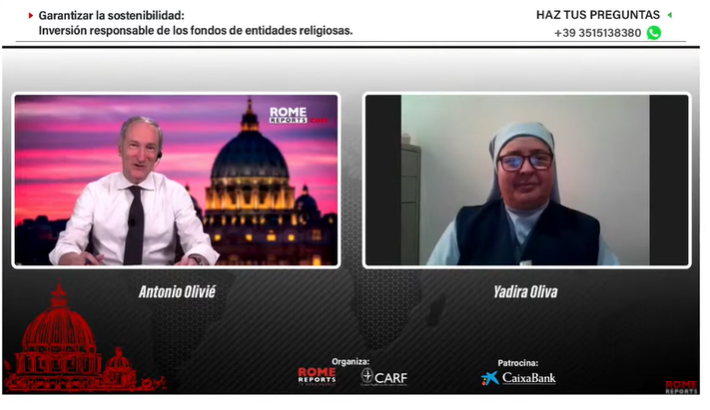
The meeting discussed how to guarantee the sustainability of religious institutions as a characteristic of development that ensures the needs of the present without compromising the needs of future generations.
In addition, the principles of responsible investment were discussed as a strategy and practice that incorporates environmental, social and governance factors into investment decisions and asset management, as recommended by the United Nations and the World Bank. Oeconomica et Pecuniariae Quaestiones published by the Dicastery for the Service of Human Development.
The participants were as follows: Cristian Mendoza Obando Priest and professor of Church Management at the UPSC of Rome; Yadira Oliva Bursar - Martha and Mary Congregation; Sergio Camarena Bursar - Augustinian Recollects and David Alonso de Linaje Head of Religious Institutions Private Banking CaixaBank. Moderator of the Meeting Antonio Olivié Journalist and CEO of Rome Report.
The teacher Cristian Mendozaan expert in the training of bursars of religious institutions, stressed the importance that the financial managers of each congregation or diocese of the Catholic Church must be "professionals" in the sector. The objective is to guarantee the sustainability of these institutions of the Church so that they serve their specific mission and charism.
He also spoke of two concepts that every institution of the Church must take into account The main challenges we are currently facing are transparency and compliance with legal regulations.
"Society is demanding more and more information. That's why, transparency in the Church is very operational".said Mendoza.
In addition, he reminded that public institutions, such as congregations in the Church, must comply with legal regulations that are increasingly on the rise. "The Church also has to comply with increasingly demanding regulations.".

This CARF Reflection meeting can be replayed by clicking on the
For her part, the nun Yadira OlivaThe bursar of the Marta y María Congregation (an institution founded in Guatemala 43 years ago and which has been in Spain since 1991), which has been working in Spain since 1991. has 700 sisters spread all over the world).explained some of the institution's economic issues.
"Our founder always tells us: you have to look beyond. In Spain we have 24 homes for the elderly and we also provide residences for priests. Many of our residences are not subsidized, but are supported by the residents' contributions. We make sure that they can receive service and generous care," Yadira explains.
One of the problems encountered is the care of elderly religious who, because of age or health problems, are unable to carry out apostolic work. Instead of building residences just for them, this Congregation distributes them in different residences so that they can share the charism.
"Our goal is to create a fund to sustain us in the future with our work."he says.
This Apostolic Congregation was founded by Monsignor Miguel Ángel García Aráuz and Mother Ángela Eugenia Silva Sánchez. It bears the name "Martha and Mary", the holy sisters of St. Lazarus, to mark the two principles that govern their lives: contemplation of the Divine Mysteries (Mary) and apostolic action in generous and disinterested service to their brothers and sisters (Martha).
Priest Sergio Camarena, bursar of the Augustinian Recollects (with more than 400 years of apostolate) took the opportunity to recall the document of the Holy See regarding the "Economics at the service of the mission"The new law, with some very clear points that refer, for example, to professionalizing the mission of each congregation or making the patrimony of each Order profitable.
Regarding investmentsHe clarified that religious institutions must rely on trained professionals, use important criteria to know with whom they are going to invest, and ensure that these investments are in accordance with the Social Doctrine of the Church, i.e., that they are in line with the Social Doctrine of the Church, to have an ethical sense of investment.
"In our Congregation, we have an Economic Council that watches over these investments and what needs to be allocated to the various social works around the world," Camerena says.
As in the Congregation of Martha and Mary, the care of the older religious of the Order is a topic of great concern.
"Our average age of the siblings is 63 years old. Some reside in external institutions, others in our own homes, and others in public institutions. It depends on each country," he explains.
For its pate, David Alonso de LinajeThe head of Religious Institutions, CaixaBank Private Banking, stressed the importance of financial planning for each congregation, i.e., knowing what money is needed today to make the institution sustainable in the future.
"Profitability is important, but not at any price.. Financial investments must be governed by prudence, legality and ethics. It is necessary for each Congregation to have experts who know the peculiarities of religious institutions," he said.
In response to questions from the people who followed this online meeting, Alonso de Linaje said that it is necessary to create some criteria so that investments respect the Social Doctrine of the Church.
Cristian Mendoza emphasized the need for professional training for bursars and, in line with the DSI, reminded them that religious institutions should not invest in portfolios that promote pornography, alcohol or abortion.
Marta Santín
Journalist specializing in religious information.